In the absence of federal action on climate change, governors have become the real leaders on the issue. Eleven governors will be elected on Tuesday, and a number of gubernatorial candidates have put forward very green plans –- as well as some not-so-green ideas. Here’s the rundown on guv races to watch this year.
—–

The Evergreen State is solidly blue in its backing of Barack Obama, but incumbent Democratic Gov. Christine Gregoire is far from assured of reelection. She’s locked in a tough and dirty battle against Republican challenger Dino Rossi, whom she beat by a mere 129 votes in a bitterly contested race in 2004. The two have been neck-and-neck again this time around; a recent poll shows Gregoire up by only two points.
Both candidates say climate change is a top issue, though Rossi questions how much warming is due to humankind. He’s called for incentives for clean energy and fuel-efficient vehicles, and for a $15 billion plan to expand highways and reduce traffic congestion, which he says would reduce emissions. He also calls for the state government’s vehicle fleet to consist of all hybrid and plug-in electric cars by 2015.
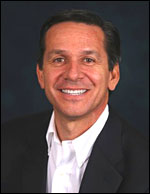
Gregoire recognizes that humans are a major cause of climate change. In 2005, she signed groundbreaking renewable-energy laws and adopted California’s tough auto-emissions standards. In 2007, she signed an executive order requiring greenhouse-gas emissions to be cut to 1990 levels by 2020 and 50 percent below 1990 levels by 2050. The measure also called for a 50 percent cut in per-capita vehicle miles traveled by 2050 and for the creation of 25,000 “clean energy jobs.” She lists “creating a cleaner future” as one of her top goals.
—–
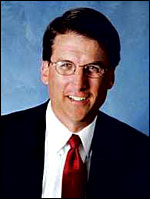
There’s an extremely close race underway to replace current Democratic Gov. Michael Easley, who is being term-limited out of office. Republican Pat McCrory, the mayor of Charlotte, and Democrat Bev Purdue, the current lieutenant governor, have been swapping spots in the polls for months.

Perdue has been putting out a tough message on clean energy in the campaign, pledging that a recently licensed coal-fired power plant in the state “must represent the end of an era for North Carolina.” “We should not license another coal-fired power plant to operate in our state,” she says. “There may come a day when carbon capture and sequestration technology makes greenhouse gases from coal-fired plants a thing of the past. That day is not today.” She also calls for cutting the state’s greenhouse-gas emissions 80 percent by 2050, dramatically increasing energy efficiency, offering $5 million in competitive grants each year for cities that develop the best emission-reduction plans, and looking into joining a regional greenhouse-gas initiative.
McCrory’s energy plan calls for pretty much everything, from offshore drilling “clean coal,” and nuclear power to mass transit, energy efficiency, and renewables. Oh, and he says he doesn’t want to “get caught up in the global warming debate,” because “it’s in God’s hands.”
—–

Incumbent Democratic Gov. Brian Schweitzer is ahead of Republican Roy Brown by 15 points and is expected to coast into a second term in office.
Schweitzer is widely known for his love of coal in pretty much any form — liquefied, gasified, “clean”, you name it. He was recently tapped to serve on Barack Obama’s “Clean Coal Jobs Task Force.”
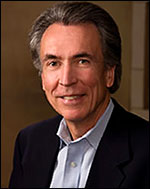
He gave a rousing speech on energy issues at the Democratic National Convention in August, riling the crowd with an anti-Big Oil, pro-renewables message (with some “clean coal” boosterism thrown in for good measure). “If you drilled everywhere, if you drilled in all John McCain’s backyards, even the ones he doesn’t know he has,” said Schweitzer, “that single-answer proposition is a dry well.”
His challenger is Republican Roy Brown, a petroleum engineer and state legislator who has attacked the incumbent for, of all things, not being pro-coal enough. Brown pledges to double coal production, build a new coal-fired power plant, and increase drilling for oil in the state.
—–
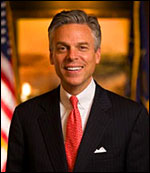
The state looks very safe for Republican incumbent Jon Huntsman Jr., who is crushing Democratic challenger Bob Springmeyer in the polls, 77 percent to 13 percent.
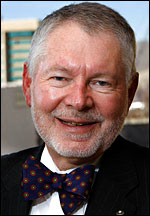
Huntsman has gotten props from enviros for signing the state onto the Western Climate Initiative last year, a move that annoyed some GOP leaders in his state. He has fought plans to store nuclear waste on a Native American reservation in Utah’s west desert. He’s put forward an energy plan that includes both renewables and development of the state’s oil-shale resources.
Springmeyer says he supports investment in renewable energy, but has been critical of Huntsman for signing on to the WCI. He was a founder and the first president of the Utah Wildlife and Conservation Foundation, according to his bio, and he is an “avid cyclist and advocate for bicycle safety” who helped start the state’s annual Josie Johnson Memorial Bicycle Rides.
—–
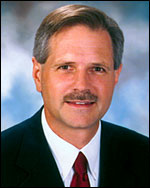
This race looks like an easy win for Republican incumbent John Hoeven, who is facing Democratic challenger Tim Mathern. A recent poll found Hoeven — whose eight years in office already make him the longest-serving governor in the country — trouncing his opponent 68 percent to 28.
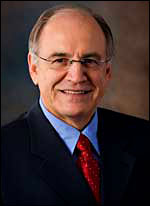
Last month, Hoeven announced that North Dakota and four other Midwest states are teaming up to support expansion of wind energy by improving electric transmission systems. He’s promoted a “multi-resource” energy program that taps the state’s “traditional energy resources, like lignite coal, oil and gas, while promoting renewable energy opportunities, such as wind, ethanol and biodiesel.”
Mathern, who has been a member of the North Dakota state Senate for 22 years, lists energy as one of his top issues. He pledges to “make North Dakota the nation’s wind energy leader,” and says as governor he would create an “office of Renewable Power Marketing” to help start-up green-energy firms and co-ops get their power to market. He would also “spearhead the construction of an environmentally friendly oil refinery” in the state, he says.
—–
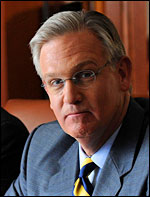
When Missouri’s current Republican Gov. Matt Blunt made the unexpected announcement in January that he wouldn’t be seeking reelection, the race here seemed to blow wide open. But polls now are showing Democratic candidate Jay Nixon way out in front, 19 points ahead of Republican candidate Kenny Hulshof.
Nixon is the state’s attorney general, and he lists environmental concerns among his top issues. “He believes that every young person ought to have the opportunity to catch a fish in a local stream, cook it and eat it — without the fear of pollutants or harmful chemicals,” says his website. He also calls for the development of “ethanol, wind, solar, bio-diesel and cellulosic-based biofuels” in the state. And in a state with a large agricultural sector, he’s called for better management of Concentrated Animal Feeding Operations, aka factory farms.
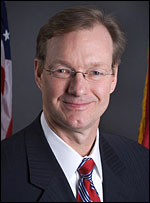
Hulshof, a five-term congressman from the state’s 9th district, lists as one of his top successes that he “has written tax policy that promotes renewable fuels like ethanol and biodiesel.” He’s likely referring to legislation he coauthored in 2007 to make the tax incentives for biofuel producers permanent, a measure that never saw any motion in the House. His energy plan calls for increased exploration, production, and refinement of the state’s oil and gas resources.
—–
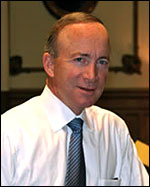
Incumbent Republican Gov. Mitch Daniels is currently enjoying a double-digit lead over Democratic challenger Jill Long Thompson.
Daniels touts the state’s work on green energy as one of his top successes in his first term as governor. This includes getting the first phase of a 750-megawatt wind farm underway in Benton County in 2007, one of the largest wind farms under construction in the world. Daniels is running an ad proclaiming that his administration will “make Indiana a leader in wind power, clean coal, biofuels, the green energy of tomorrow.”
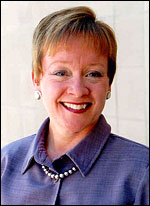
Long Thompson is also promoting wind, with turbines featured prominently on her website. She’s put forward a plan for a “Green Jobs Initiative” that would offer tax credits or other inducements to companies that create new jobs in green industries or otherwise push toward a clean-energy economy. She says she would also get the state involved in the Climate Registry, to track and report greenhouse-gas emissions.
—–
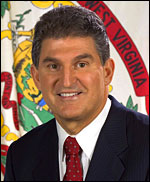
Democratic incumbent Joe Manchin is expected to cruise to victory next week; a recent poll shows him with a 50 point lead over Republican candidate Russ Weeks.
West Virginia is, of course, a coal state, and Manchin has been a strongly pro-coal governor, supportive of controversial mountaintop-removal mining. He’s been talking up clean energy, but he seems far more proud of efforts to build “clean coal” and coal-to-liquids plants. In 2007, his administration allowed coal company Massey Energy to build another silo on an already-contaminated site 300 feet away from an elementary school, despite the pleas of parents and other citizens. More recently, he’s refused to intercede as Massey threatens to move forward with blasting another mountain without the proper permits.
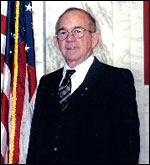
Weeks hasn’t put forward a comprehensive energy plan, but he has this to say about energy on his campaign site: “Resources from our institutes of higher learning, government economic development and the mining industry should be brought together to develop a viable plan to gasify and liquefy coal. West Virginia could and should be the leader in providing the world with new sources of clean energy.”
—–
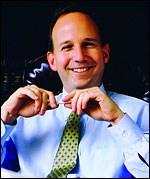
Democratic State Treasurer Jack Markell is currently ahead of Judge Bill Lee by a margin of 28 points, making him the likely winner in the race to replace Democrat Ruth Ann Minner, who is being term-limited out of office.
Markell has laid out an energy plan [PDF] that includes reducing the state’s reliance on oil and other fossil fuels by “developing cleaner, renewable sources of Delaware-grown energy.” “Our heavy reliance on fossil fuels … puts Delaware at a competitive and environmental disadvantage,” he says. The state already has a renewable electricity standard in place, requiring at least 20 percent of power to come from renewables by 2019, and Markell says the state “can pursue other strategies to support renewable energy,” like tax credits for green buildings and pilot programs to deploy solar panels.
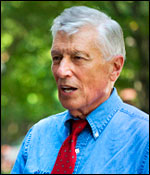
Lee hasn’t released much in the way of an energy or climate plan, but he has suggested that “cancer clusters” in the state are tied to air and water pollution and pledged to tackle the problem. “Delawareans deserve better than a Governor who lets the big corporations run wild and pollute our air and water with no consequences,” says his website.
—–
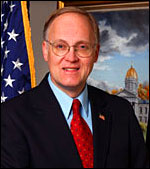
Republican Gov. Jim Douglas looks likely to win this race against two challengers, Democrat Gaye Symington and Progressive Party candidate Anthony Pollina.
Douglas last year put out a climate-change plan for the state, though enviros criticized it for lacking detail. He set the goal of reducing the state’s greenhouse-gas emissions 25 percent by 2012, and has called for a “Vermont Green Standard” that could help the state become a leader in carbon trading. In March, he signed a law to promote solar, wind, and efficiency measures, after previously vetoing a similar measure.
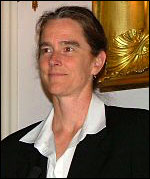
Symington, the Vermont House Speaker, says that the “time has come to re-imagine how we provide warmth in our homes and businesses,” and she has called for a renewable electricity standard of 20 percent by 2020. “When I’m Governor, I will work for the day when Vermonters will no longer be at the mercy of giant oil companies,” she says.
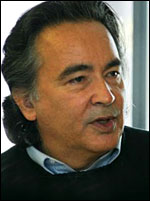
Pollina calls for the state to “declare independence from industrialized agriculture.” He co-founded the farmer-controlled Vermont Milk Company, which produces ice cream, cheese and yogurt, and served on its board of directors until 2008. He was the also the founder and executive director of Rural Vermont, a nonprofit farm advocacy organization. Pollina says energy should be “Vermont-owned and Vermont,-community-controlled,” and he calls for investing $5 million a year in building energy-efficient, affordable housing and $4 million a year in retrofitting existing structures.
—–
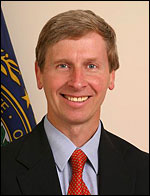
Democratic Gov. John Lynch is looking very safe in his reelection bid against Republican State Sen. Joseph D. Kenney, with a lead of 67 percent to 17 in recent polling.
Lynch has made some progress on climate in his first term in office, establishing a Climate Change Task Force, signing the state onto the Regional Greenhouse Gas Initiative, and setting a goal of drawing 25 percent of the state’s electricity from renewable sources by 2025.
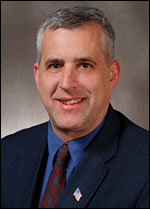
Kenney hasn’t laid out a formal energy or climate plan — at least not one that’s easy to track down — though he has called for energy audits of all state buildings and improved efficiency. He’s criticized the state’s involvement in the Regional Greenhouse Gas Initiative. “RGGI was supposed to provide energy-efficiency programs for New Hampshire through this auction allowance process with nine other states,” said Kenney. “In reality, we already have a system’s benefits charge on our electric bill right now that provides $20 million for weatherization and for energy-efficiency programs. So why would we want to put a third tax on our energy bills right now to increase electric bill costs in the state of New Hampshire?”


